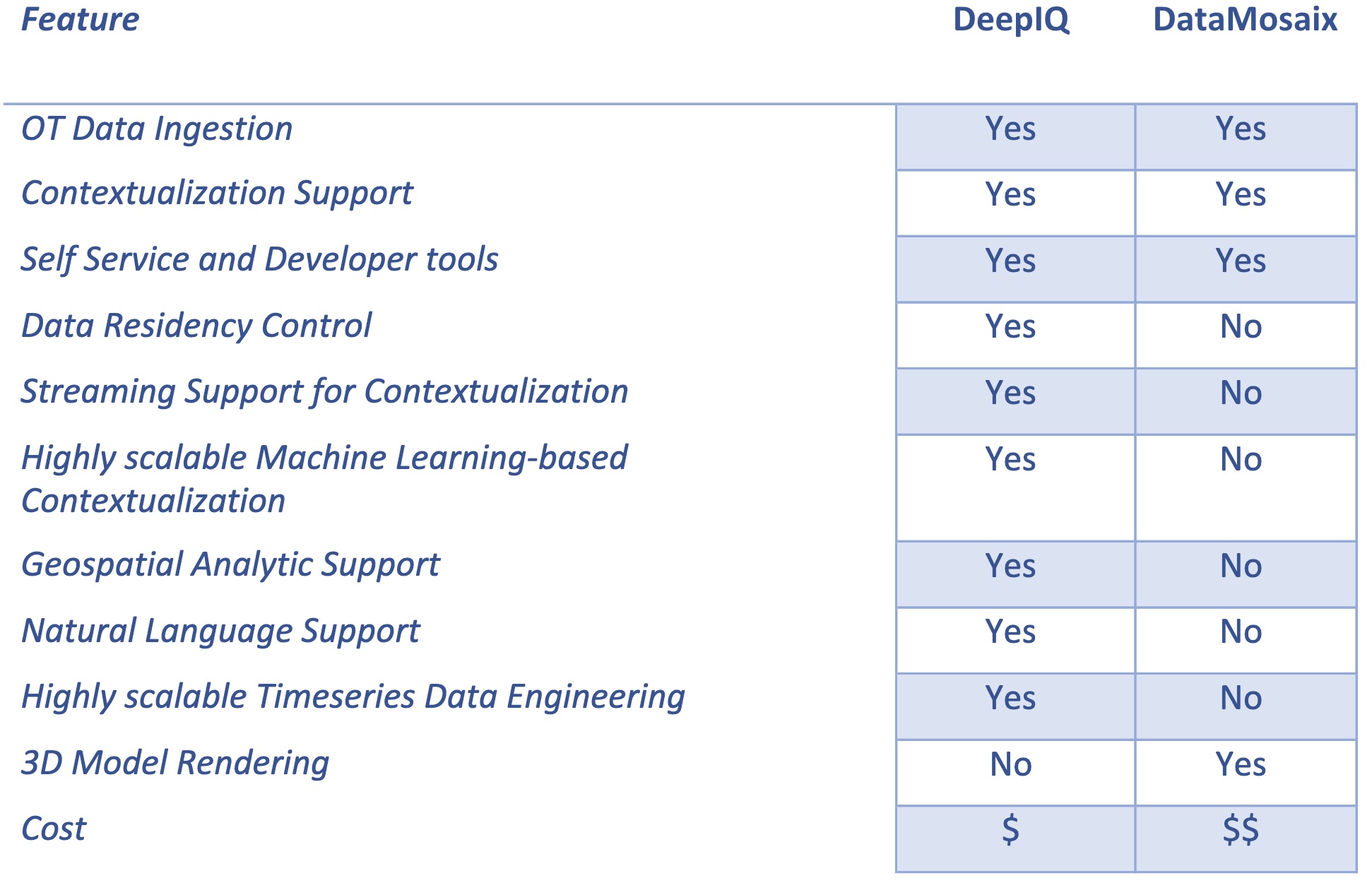
Product Features
Native Data Lake support
Most industrial companies have already chosen a data lake platform available on one of the public cloud environments as the central hub for all their enterprise data needs. DeepIQ extends this existing data lake platform to include IT-OT convergence. By leveraging your existing data lake, DeepIQ maintains a unified and streamlined approach to managing and analyzing data across your entire enterprise ecosystem. In contrast, DataMosaix employs a proprietary data model hosted by it, introducing the need for additional integration efforts with your established data lake or vice versa.
Data Residency Control
While DeepIQ operates as a SaaS platform, its architecture ensures that data consistently resides within your tenant. By separating DeepIQ’s control and data planes, computing processes and data remain within your designated cloud network. As a third-party single-plane platform, DataMosaix transfers data outside your cloud tenant.
Streaming Support for Contextualization
As you develop data contextualization workflows, the next step is integrating the results into your real-time applications. For example, you might want to incorporate data from your SCADA system with readings from handheld devices to execute real-time predictive health models. With DeepIQ, you can seamlessly access your contextualization results directly within streaming workloads, achieving sub-second latency.
Machine Learning-based Contextualization:
In numerous contextualization scenarios, rule-based mappings can prove cumbersome. DeepIQ offers a workflow grounded in statistical and machine learning principles, utilizing temporal, geospatial, numerical, and textual properties of entities/events to establish mappings across diverse systems. In practical applications, DeepIQ has consistently achieved over 95% accuracy in automated mappings. Furthermore, the system is engineered to scale seamlessly to accommodate millions of entities.
Geospatial Analytic Support
Whether you’re actively involved in real-time tracking and optimizing vehicle routes or seeking to improve the effectiveness of globally distributed supply chains, certain situations necessitate the integration of your IT-OT datasets with geospatial data sources. DeepIQ offers comprehensive support for seamlessly ingesting and analyzing geospatial data sources at scale. This support encompasses handling various geospatial data formats and executing sophisticated geospatial transformations, including resampling to different resolutions, noise removal, and integrating disparate sources. Additionally, DeepIQ provides robust support for geospatial queries, empowering users to extract valuable insights from spatial data. DataMosaix does not support geospatial capabilities.
Time-Series Data Engineering
Managing statistical and machine learning analytics on distributed time-series data is intricate due to challenges in data synchronization, consistency, and the necessity for advanced algorithms capable of capturing temporal dependencies, trends, and seasonality. DeepIQ offers native no-code support for distributed time-series data transformation workflows. This distinctive feature enables scalability to handle terabytes of data and process millions of messages per second. It sets DeepIQ apart in its ability to address the complexities of distributed time-series analytics.
Natural Language Support
Following the integration of IT-OT data, the crucial next step is to support the generation of insights at scale utilizing this integrated data. DeepIQ offers native Gen AI support, enabling users to query the integrated datasets using natural language. DeepIQ’s proprietary technology, combined with comprehensive traceability of results, has demonstrated high response accuracy, approaching human-like performance, in current fielded applications. This approach goes beyond traditional canned reports, empowering users to extract insights at scale through intuitive and conversational interactions with the data. Current versions of DataMosaix do not support a natural language interface.
3D Model Rendering
The DeepIQ software is dedicated to DataOps, enabling users to visualize dynamic and static data. Notably, 3D plots are currently not a supported feature. DataMosaix facilitates 3D model rendering for visualizing physical assets.
Cost
The final consideration is cost. DataMosaix is based on multiple factors, including users and data points analyzed. DeepIQ’s pricing does not increase with the volume of data analyzed. As your usage scales up, DeepIQ costs stay consistent and are determined solely based on licensed users. This transparent pricing structure ensures easy observation and control, preventing unexpected and high costs.
Conclusion
Beyond these advantages, DeepIQ provides other benefits to DataMosaix customers. Being an open platform, DataMosaix allows users to transfer data to their established data lake for cross-functional analytics. DeepIQ DataStudio can be used to orchestrate this transfer, ensuring the availability of comprehensive enterprise data, including IT-OT convergence data in a single platform. With DeepIQ, you also gain a user-friendly natural language interface for subject matter experts to access this data, along with robust support for cross-functional analytics, including real-time capabilities.
